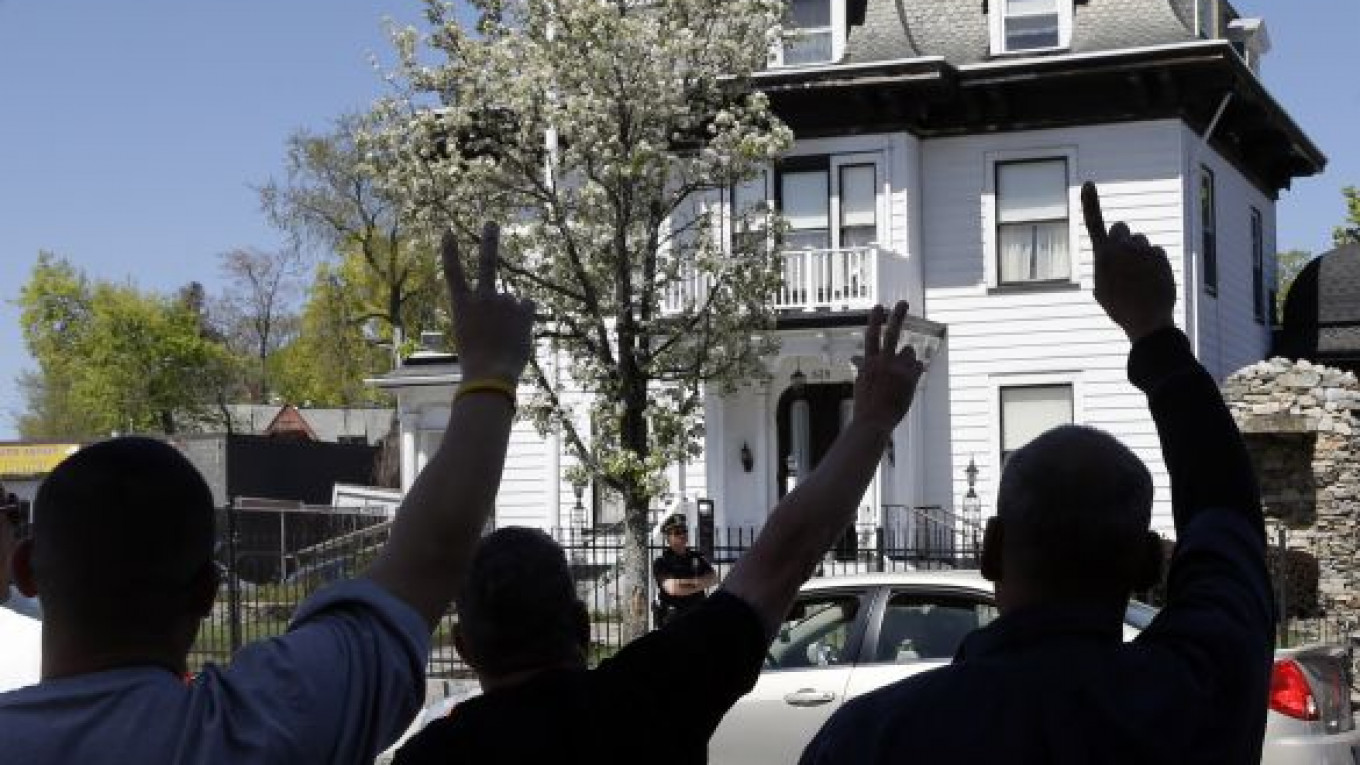Related story: Take a look at how some of history's most well-known criminals have been buried over the years.
BOSTON — A U.S. funeral director said he has received burial offers from out-of-state cemeteries for the body of a Boston Marathon bombing suspect who was killed in a gun battle with police, even as Tamerlan Tsarnaev's mother told him she wants the body returned to Russia.
But funeral home director Peter Stefan said that despite the request, he doesn't think Russia will take Tsarnaev's body and he is working on other arrangements.
He declined to be more specific.
The question of where Tamerlan Tsarnaev will be buried dragged on for another day, and the issue seemed far from resolved.
Stefan said he plans to ask for a burial in the city of Cambridge, where Tsarnaev lived. Cambridge has asked him not to do so.
Stefan also said he had out-of-state burial offers but refused to give additional details, adding he was worried protests will rise up at any place that agrees to the burial, as they have at his own funeral home.
"Once the neighbors find out who's coming, they're going to come out," he said.
The founder of the organization that built Colorado's largest mosque, Sheikh Abu-Omar Almubarac, said he was offering to bury Tsarnaev in a Denver-area Muslim cemetery. He said he would bury Tsarnaev as long as his family could get the body to Denver.
If Russia refuses to accept the body, Cambridge may be forced to take it, said Wake Forest University professor Tanya Marsh, an expert in U.S. law on the disposal of human remains.
Massachusetts law requires every community to provide a suitable place to bury its residents, she said. Cambridge's appeal to the family not to ask it to bury the body is likely a way to set up its defense if the family goes to court to try to force the burial, Marsh said.
Such a case would be unprecedented in Massachusetts, she said. She added that even in a country that's had its share of notorious accused killers, this kind of opposition to a burial is unheard of and is exposing holes in the law, Marsh said.
"It's a mess," she said. "We're really sort of in uncharted territory."
Tamerlan Tsarnaev's uncle, Ruslan Tsarni, of Montgomery Village, Maryland, and three of his friends met with Stefan on Sunday to wash and shroud Tsarnaev's body according to Muslim tradition.
Tsarni told reporters that he was arranging for Tsarnaev's burial because religion and tradition call for his nephew to be buried. He would like him buried in Massachusetts because he lived in the state for the last decade, he said.
As the fate of the body remained unclear, Robel Phillipos, a friend of bombing suspect Dzhokhar Tsarnaev, was released on $100,000 bond while he awaits trial for allegedly lying to federal investigators probing the April 15 bombings.
Phillipos, 19, who was a student at the University of Massachusetts Dartmouth with Tsarnaev, was charged last week with lying to investigators about visiting Tsarnaev's dorm room three days after the bombings. He faces up to eight years in prison if convicted.
The Tsarnaev brothers are accused of carrying out the bombings using pressure cookers packed with explosives, nails, ball bearings and metal shards. The attack killed three people and injured more than 260 others near the marathon's finish line.
Dzhokhar Tsarnaev was captured and remains in a prison hospital. He has been charged with using a weapon of mass destruction and faces a potential death sentence if convicted.
The state medical examiner ruled that Tsarnaev died from gunshot wounds and blunt trauma to his head and torso, and authorities have said his brother ran him over in a chaotic getaway attempt.
Tsarni has denounced the acts his nephews are accused of committing and said they brought shame to the family and the entire Chechen ethnicity. The brothers are ethnic Chechens from Russia who came to the United States about a decade ago with their parents. Both parents returned to Dagestan last year.
Related articles:
A Message from The Moscow Times:
Dear readers,
We are facing unprecedented challenges. Russia's Prosecutor General's Office has designated The Moscow Times as an "undesirable" organization, criminalizing our work and putting our staff at risk of prosecution. This follows our earlier unjust labeling as a "foreign agent."
These actions are direct attempts to silence independent journalism in Russia. The authorities claim our work "discredits the decisions of the Russian leadership." We see things differently: we strive to provide accurate, unbiased reporting on Russia.
We, the journalists of The Moscow Times, refuse to be silenced. But to continue our work, we need your help.
Your support, no matter how small, makes a world of difference. If you can, please support us monthly starting from just $2. It's quick to set up, and every contribution makes a significant impact.
By supporting The Moscow Times, you're defending open, independent journalism in the face of repression. Thank you for standing with us.
Remind me later.






